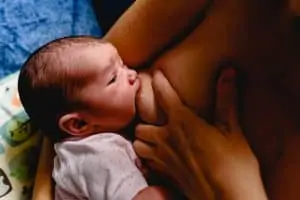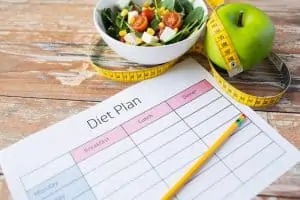I remember being so relieved after giving birth to my first daughter. Finally, no more heartburn! Finally, I could eat what I wanted! Or so I thought.
As it turns out, when you’re breastfeeding, you still need to be mindful of what you eat to help nourish your baby. Those nutrients you’re getting pass through the milk to nourish your baby. And you know what else does too? The flavors of the food!
While formula has the same flavor every time, breast milk varies in flavor based on what you eat. When my breastfeeding coach had told me that, I thought that was amazing.
If you look around the internet, you’re bound to find bunches of articles about “what not to eat” from other moms. I’m not going to do that to you because, well, it’s just not true. There are some things to be mindful of, yes, absolutely. But there isn’t a list of things that will harm you or your baby if you eat them while breastfeeding.
I get this from both Medical News Today and La Leche League, each entity explaining that there is no one food to avoid while breastfeeding. There is nothing special you need to eat or avoid though what you need to be doing is ensuring you’re eating healthfully as much as possible.
The better you eat, the better nutrients you and your baby get. You need to build your body’s strength back up after the trying process of having a baby. You may want a chocolate sundae (geez, don’t we all?!?) and there’s nothing wrong with that on occasion, but for the most part, you should be making healthy selections when you’re eating.
Ketogenic diet is a trend and I have already discussed whether you should try this or not.
There is a big “but” in all of this though, so keep reading to find out more!
When You Should Avoid Certain Foods
Most breastfeeding moms won’t find a problem at all with much of what they eat or drink. But others may notice a gassy baby or that their colicky baby seems extra irate after the consumption of a few things, which I’ll get to in a second.
Before I forget, I want to touch on some of the foods you should limit while breastfeeding. It has nothing to do with upsetting your baby. In small amounts, these items are fine:
Seafood with mercury
Eating seafood, especially if you love it, is great for your breastfeeding baby. However, make sure you know where it’s coming from. High levels of mercury aren’t good for you or your baby. Sourced properly, you have nothing to worry about.
Caffeine
Love coffee? Go ahead and enjoy it, but be careful! Keep an eye on how your baby acts. If she seems difficult to put down for naptime or bedtime, you might need to cut back on your consumption.
Alcohol
There’s a lot of misinformation out there about consuming alcohol while breastfeeding. During pregnancy, it’s dangerous because it goes through the placenta. But while breastfeeding, only the amount of alcohol that has gone into your blood will be a factor. In other words, enjoy that glass of wine, Mama. You deserve it. But drink like you’re at a frat party? Not a good idea.
I drank while breastfeeding both of my daughters. I’ve mentioned my dad is a doctor and he said it was fine as long as I wasn’t getting loaded or doing it every single day.
Elimination Diet for Breastfeeding Moms

Most breastfeeding moms will eat what they like and have no problems. Some though will notice a pattern after they eat something and then nurse their babies.
If you find that every time you nurse your baby after having a glass of cow’s milk, eating yogurt, or indulging in cheese, it could be cow’s milk protein intolerance (CMPI).
If your baby is sensitive, this could be something that affects him. How will you know? You may notice colicky symptoms develop. He could also vomit, have diarrhea, wheeze, be constipated, or break out in a rash. You’ll likely panic all the way to the pediatrician (who wouldn’t?) and be asked to eliminate dairy from your diet.
Yes, that would mean no more ice cream or finding an alternative (like vegan versions) to try instead. This phase won’t last forever though. Your baby will be able to handle cow’s milk later on. Just be cautious if you do determine that cow’s milk is causing the problem. Some items have hidden sources of dairy in them which is why it’s so important to read labels.
What causes gas in babies being breastfed?
Other things may seem to cause your baby to be gassier than usual. Cruciferous vegetables, particularly broccoli, seem to agitate sensitive babies. If you notice your baby seems highly annoyed breastfeeding after you’ve eaten broccoli, cauliflower, or cabbage, cut back on those foods to see if it makes a difference.

Ultimately, eating a well-rounded healthy diet for yourself and for your breastfeeding baby is what counts here. If you notice your baby acts differently after you eat certain foods, simply avoid those foods.
How Do You Know?
One thing I found very helpful, thanks to my breastfeeding coach, was to write down what I’d eat every day. I did this primarily for my fitness to get back in shape after my first child, but I also did it because she was a bit of a colicky thing, driving us mad for about 2 months every night.
Vivien wanted to see if we could find a pattern in what I was eating to see if that might help soothe our girl. Turns out, when I ate a LOT of dairy food, she became more agitated. When I ate small amounts of it, she was fine.
Other friends of mine at gobs of dairy without incident. Even with my second daughter, nothing I ate ever bothered her when she was breastfeeding. Each baby is different, so keeping an eye on what you eat and when, how much of it, and all the pertinent info will help you identify if there’s a problem and what you’ll need to eliminate to set things right.
Food Rumors – Finding the Truth in Breastfeeding Foods
Hopefully, I’ve been opening your eyes to the world of misinformation out there on the internet about foods you can and can’t have. There are a few other foods we need to talk about though too.
First up, allergens. Are you allergic to anything?
If so, it’s probably very obvious for me to tell you not to eat it. BUT, and you know I love ‘buts,’ knowing if there are any allergies on your side of the family or your husband’s side is also important. Because it’s easy to know whether or not you can eat something. But does anyone in your family have a nut allergy? Best to make sure of that now and have a conversation with your pediatrician.
Speaking of nuts, unless you are allergic or the allergy runs in your family, it’s fine to have nuts. One thing that drove me nuts (pardon the pun) was hearing how many people had nut allergies in the states. During both my pregnancies, I ate tons of nuts. Chinese people use peanut oil for most of their dishes. I never once in all my years there even heard of anyone with a nut allergy.
That should tell you something right there. In fact, experts believe that eating it (as long as you’re not allergic that is) helps build a tolerance to it. That’s basically with all foods too.
Cultural Viewpoint
I’d also like to touch upon the cultural aspect of foods while breastfeeding. Every country seems to have their own little codes of conduct with food. Either they think you should eat a certain food to boost breastmilk (more on that shortly) or they think you should avoid it. La Leche League points out how new Italian moms are told not to eat garlic, lentils, or cauliflower while in India, it’s encouraged.
In China, I was told to eat a soup of millet, which they call Xifan. I was told it would bring in more breastmilk and make me healthier. I haven’t found anything to prove or disprove it, though Medical News Today specifies good grains and millet is a good grain.
Additionally, you shouldn’t worry about eating spices. Look at other cultures. I ate tons of spicy foods while in China. My kids seem to have a higher tolerance for spicier items. That means I can put out a platter of chips and salsa using the spicier version and they gobble it up. They got used to it in the womb and still tolerate it fairly well. Though spiced as spicy as my husband likes things? We’re still working on that!
Do Any Foods Increase Breastmilk?
If you are getting the proper latch, your baby should be getting enough milk. Keeping an eye on how many soiled diapers (either urine or feces) will tell you if your baby is eating enough. And if the scale keeps tipping to the heavier side, he’s definitely eating enough.
Still, that doesn’t stop well-meaning people from trying to tell you that you can make more milk by eating certain foods. There is research to back it up, BUT (there’s that ‘but’ again), you must be having your baby suckle at your breast and/or using your breast pump to stimulate your body’s hormones to keep producing milk.
These foods are known as galactagogues, and you’ll find them in every culture around the world. In South Korea for example, the women are made to eat a seaweed soup for a month while they recover, and it’s supposedly good for breastmilk production. And I’ve already told you about Xifan. My mother-in-law would force that upon me with every meal. I just wanted bacon and eggs but nope. I got a big bowl of soup for breakfast with a hardboiled egg. At least she meant well.
Of the galactagogues that have been researched most, fenugreek seed and goat’s rue top the list. Oatmeal is also said to help.
Regardless of the research, these foods do help keep you healthy, and that’s really the bottom line. You could have 5 kids and they all might never respond adversely to anything you eat while others could have 2 kids that both have different food triggers.
Essentially, it’s a crapshoot, but follow my advice and keep that food journal. Not only will you see when you need to cool it on the donuts, but you’ll also see what you’re eating and how that correlates with how your baby acts.
A one-off incident could merely be a cold, but keeping tabs on it will give you hard evidence so you’re not cutting out foods all willy-nilly with no actionable plan. In short, eat your fruits, vegetables, grains, and lean proteins. Be moderate with caffeine and alcohol. Watch where your seafood comes from too.
Oh yes, and if you were upset about not being able to eat sushi while pregnant, now you can! Just follow the mercury rule and you’re good to go!
Leslie Berry lives with her husband and two young daughters in Los Altos, California, where she loves helping other moms get comfortable with motherhood and embracing the insanity with facts peppered with laughs.
She loves eating too much sushi, exercising, and jamming out on her Fender. Read more about Leslie here.






